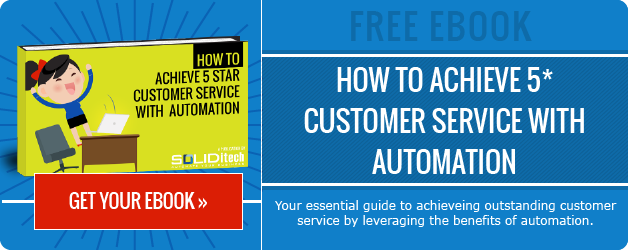When done right, business process automation can help organisations achieve much higher levels of productivity by removing countless redundant processes and workflows that no longer serve the company.
In businesses such as ISPs, where the employee-to-customer ratio is significantly higher in favor of the latter, automation plays a key role in performance. Interfacing with the modern customer, therefore, requires creating touch points on an array of platforms such as social, mobile, web, email, telephonic and other means.
Customer self-service tools and process automation combine like a match made in heaven to bring support representatives the key tools needed to interface with your market with elevated efficiency. Let’s take a look at the interrelation between these two elements to understand how they co-exist to bring customers added value and simultaneously improve the internal workings of the business.
Customer self-service and automation are two sides of the same coin
When delivering pre- and post sales services, customers expect fast response times to queries or problems. In addition, they expect to have convenient access to channels to reach your business. Customer self-service mediums that provide quick access to information and tools rely on automated back-end processes to provide up-to-date information and allow profile changes to be made seamlessly while being committed automatically to the system. When a customer is able to navigate a well-designed self-service portal and make the desired changes, it is thanks to powerful back-end automation systems that, in turn, are only as good as the soft- and hardware platforms they are built on. Automation platforms exist to incorporate multiple information channels within a business and provide an integrated software solution that is capable of delivering solutions across the board - be it CRM, financial or operational tasks.
In unison, automation and customer self-service make things easy
When your customer portals are difficult to navigate, or lack the tools to give the desired output, your call centre becomes flooded with tickets that could otherwise have been resolved at first contact. This creates bottlenecks in the system and underutilisation of human capital. Support staff should ideally be dealing with more complex issues or providing value added services to both the business and the customer. With automation powering the customer self-service platform, businesses with a high volume of daily customer contact events can benefit in the following ways:
- Elevate customer service experience
- Shorten turnaround times
- Create cross- or up-selling opportunities
- Activate services through automated system triggers
- See processes from end-to-end and understand how to improve on them
- Track, manage and analyse customer requests, queries, complaints, habits and patterns more efficiently
- Configure workflows that include approval chains for faster service delivery
- Make more channels available to customers and empower them with management tools
Automation has to drive the modern ISP
The modern ISP needs to be a forerunner in adoption and can’t afford to be perceived as lagging behind on technology. No customer today will sign up with a provider who is still invested in archaic internal and external processes. Empowering your clients with feature-rich self-service channels that interface with powerful back-end automation systems addresses a host of problems in the ISP environment. With billing, provisioning and operational schedules that continue almost around the clock, an integrated software platform that is accessible, up-to-date and centralised, places the ISP in a position to take efficiency and productivity to the next level.
SOLIDitech is a future-facing business automation solutions provider with over 15 years’ experience working with top ISPs. Our approach to software integration means that your business relies on a central database that delivers real-time information in an actionable way to bring efficiency to both you and your valued customer.






![5 [Great] Reasons to Automate your Customer Portal](https://blog.soliditech.com/hubfs/5-%5BGreat%5D-Reasons-to-Automate-your-Customer-Portal---UPDATED.png)
Comment